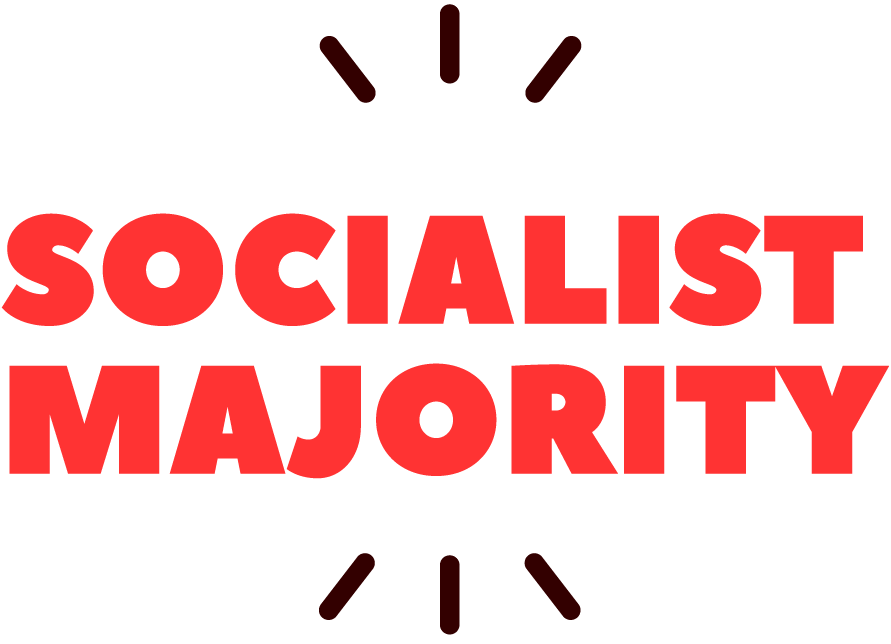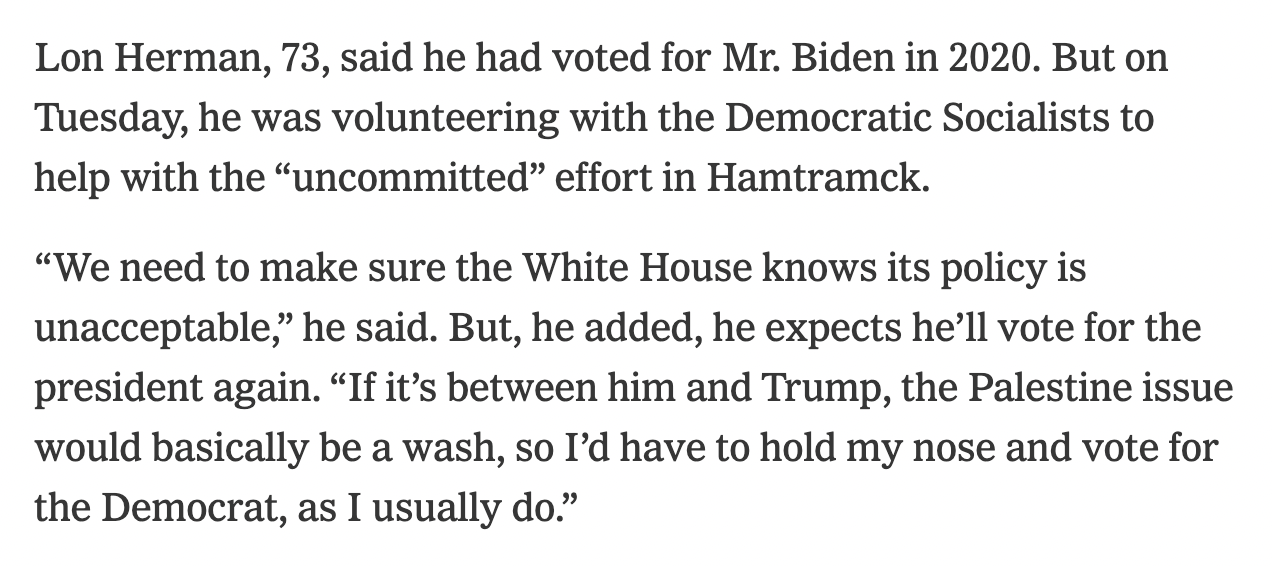Renée Paradis and Uncommitted: How SMC Members Contributed to the Historic Protest Vote Against Genocide in Gaza
SMC members have been among the DSA members who threw themselves into building “Uncommitted” campaigns across the country. As part of a limited series, we’re interviewing three of our SMC comrades about the roles they played in DSA’s efforts to build a national movement to stop U.S. funding of Israel’s genocide in Gaza.
These interviews were conducted over the phone between April and June 2024, and have been edited for clarity. This is the first interview of three in this series.
Renée Paradis
Renée Paradis is a member of East Bay DSA and currently serves on DSA’s National Political Committee. She has been an SMC member since 2019.
How did you get involved in the Uncommitted campaign?
I was invited last fall, alongside other NPC members, to an informal meeting of activists, journalists, and academics about what the left should do about the presidential election. The primary focus was using the primaries as a pressure point to stop the war. People were also anxious about the likely outcome of the presidential election if Biden remained the nominee and arming and supporting the Israeli genocide remained his policy.
Out of that, one or two of the organizers in that group settled on the idea of running a campaign to get people to vote “Uncommitted” in Michigan’s presidential primary, the state with the largest Arab and Muslim Democratic voting bloc. I was a little skeptical of Uncommitted as a strategy at first: I generally think that a protest candidate, someone who people have heard of and who can campaign, is an easier way for people to grasp onto stuff like this. To make this work, the campaign would need to reach a lot of young voters and a lot of people who aren’t familiar with the detailed mechanics of American electoral procedure.
“To make this work, the campaign would need to reach a lot of young voters and a lot of people who aren’t familiar with the detailed mechanics of American electoral procedure.”
I ended up getting involved directly in Michigan because the campaign needed a lawyer to sign off on their mailings. In a federal election campaign, any mailings, posters, flyers, etc. have to have a “disclosure box” on them saying who paid for it. Uncommitted was sort of a funny campaign for compliance: the official message wasn’t for any particular candidate, so it didn’t feel to a lot of people like an electoral campaign that needed a disclosure box. But whatever the vibes were, the law is pretty clear. Technically speaking, Uncommitted was an independent expenditure (IE) campaign advocating against voting for Joe Biden in the Michigan Democratic presidential primary. I got brought on to review mailings and then realized that because it was an IE, we’d have to do 24-hour filings every time the campaign spent $1,000 or more.
Part of the reason I ended up as the campaign’s lawyer is that they had a hard time finding lawyers willing to work for an anti-Biden campaign. There’s not a huge amount of election law work to go around. If you need to make your living being regularly hired as a lawyer by Democratic candidates, being associated with this kind of campaign can be seen as a risk. Indeed, one of Listen to Michigan’s other vendors canceled their contract after turning up on an FEC report. For me, Uncommitted was, if anything, more respectable to “normie” Democrats than my DSA work, so I didn’t hesitate to help out.
After Michigan had such an impact, organizers in other states spun up campaigns super-quick and I kept being asked to provide basic compliance advice to groups in various states—walking people through how to set up PACs, register with the FEC, do daily filings, and so on, in Washington, Wisconsin, New Mexico, New Jersey, and Minnesota. I also talked to people in New York and Pennsylvania about how to approach campaigns in those states given the lack of an Uncommitted option on the ballot. Since then, I’ve also been repping DSA with the national Uncommitted umbrella group as they turn toward DNC organizing.
How would you describe DSA’s role in the Uncommitted coalition?
DSA is one of the larger national 501(c)(4) membership organizations that regularly does in-person left election work on the ground through chapters in every state. We’re also able to act independently because we don’t depend on outside funders. And while that can mean DSA lacks resources, it can also lend itself to spinning up new campaigns quickly. Combining these factors with our strong anti-war stance made Uncommitted a natural fit. We’re one of the few groups (and in some states the only group) that’s been doing significant door-to-door canvassing for Uncommitted. We ran the only door-to-door canvasses in Michigan, and I think we also did a lot in Wisconsin and Maryland. That’s why so much of The New York Times story the night before the election covers DSA canvassers—the canvass they covered was a Metro Detroit DSA canvass in Hamtramck.
Excerpts from The New York Times, “Michigan Voters Talk About How the War in Gaza Factored Into Their Decision,” published February 27, 2024.
“This is really the party-surrogate model at its best.”
Because we joined the campaign in Michigan a little later, Detroit DSA used the Listen to Michigan infrastructure in that state. But once we had a little lead time, DSA chapters in later states used DSA’s VAN access, phonebanking tools, and other electoral and organizing infrastructure already in place. This is really the party-surrogate model at its best. Because we’re part of a broader progressive universe, we have access to and can use the infrastructure of the Democratic Party and its vendors, and our members know how to run on-the-ground campaigns. But we don’t have the dependence on funders or clients that can hold back other organizations or professionals like lawyers and consultants from acting against the party. Add that to the fact that we can move bodies, and you have a capable independent entity able to build power and support things that few others can or will.
Who did you work with outside of DSA?
One of the unique aspects of the Uncommitted campaign is that because there’s no candidate, there’s no central campaign nerve center—instead, each state’s campaign has had a different coalition behind it, with many repeat players and some national coordination and resources. The coalitions have tended to involve three kinds of groups—Arab and Muslim-led organizations, both local and state groups and national groups and their state affiliates; the electoral left, including DSA, Our Revolution, and the Working Families Party; and groups that focus on either Palestinian solidarity in particular (Jewish Voice for Peace, If Not Now) or the anti-war movement in general. It’s very similar to the Reject AIPAC coalition DSA has been a part of, and has a lot of overlap with other coalitions we’ve been a part of since October 7th. None of these groups could pull off Uncommitted or any campaign big enough to make an impact on their own; together, we’re forming an anti-war electoral left movement that has to be taken seriously.
So, you know, it’s about building those connections. And I can say that our involvement with this work has been really good from that perspective.
How did being in Socialist Majority help or impact your participation?
I think that the Uncommitted campaigns are right in line with SMC’s political vision. If I had to sum up SMC electoral doctrine, it’s that Bernie was right. Bernie’s innovation was that you can actually maintain independence in your rhetoric while intervening in a Democratic primary to run as a socialist. And you have to intervene in the Democratic primaries rather than run quixotic and losing third-party campaigns, because the two-party system is a simple fact of contemporary American politics.
In a classic multiparty parliamentary system, all the parties in the ruling coalition will negotiate after the election in order to form a government. You vote for your small party and its pure vision of governance, and then it compromises after the election to get power as the junior party. If voters feel betrayed, at least it’ll be months or years before they have to ask for their vote again.
“If I had to sum up SMC electoral doctrine, it’s that Bernie was right.”
In America, the ruling coalition—the major parties—have to form before the election; in fact, they’re semi-permanent. So all the compromise comes on the front end, which has some benefit in making clear what you’re voting for, but means your candidate breaks your heart and then immediately afterward asks you to vote for him. Right now, the left is essentially an ascendant junior party that in a parliamentary system would threaten to bolt from the ruling coalition and bring down the government. We can’t do that as cleanly in the United States; our only practical way to challenge the corporate Dems that currently have the upper hand is in primaries. With Uncommitted, though, that’s effectively what we’re trying to say: if you don’t make some basic concessions on this issue, we might crash your governing coalition. It’s important to a bunch of Democratic constituencies, it’s important to our members, it’s important to this broad group of people.
During the Bowman controversy back in 2021, a lot of people essentially said if you don’t want to expel Jamaal Bowman (which I didn’t, and I organized to prevent), you don’t care about Palestine. It wasn’t true then, and it isn’t true now. And I think Bowman’s movement since 2021 has shown that we were right not to expel him. What we’ve been doing with the Uncommitted work, with the No Money for Massacres work, is figuring out a way to try to move the needle through DSA-style electoral and mass grassroots legislative campaigns on ending the genocide and ultimately ending the occupation.
How do you feel about the results? What’s next for the movement?
I got involved with Uncommitted to advance two goals: stopping the brutal, ghastly, inhumane genocide of Palestinians and preventing Donald Trump from winning the presidency. I want to preface everything I’m saying in response here with an acknowledgment that we do not feel closer to either of those two goals than we did in January.
“I think Uncommitted was a good strategy because it hits the Democratic Party where it hurts—its vote share.”
On one of the early No Money for Massacres calls, I was asked to emcee. I said I didn’t think our movement was strong enough to stop the massacre we knew was already underway, but I did believe it’s within our power to build a movement strong enough to stop the next one. I was despairing the other day that so many people in this country and around the world have done everything ordinary people can possibly do to make their voices heard–written, called, emailed, yelled at our elected leaders, marched on capitol buildings and down city streets, shut down bridges, fundraising dinners, arms factories, literally set themselves on fire to try to stop the slaughter of Palestinians by a brutal genocidal regime, and it can feel like nothing has changed; one of the people I said this to came up to me a little while afterward and said, look, I understand why it feels like that, but you don’t know if it would be worse if people weren’t pushing back.
I think Uncommitted was a good strategy because it hits the Democratic Party where it hurts—its vote share. These are the people who might not vote for you if you don’t change course on Gaza, and we did see some movement in the administration’s messaging post-Michigan.
Now of course, everyone wants Biden off the ticket because he can’t reliably form a coherent sentence or walk in a straight line. But the voters he’s alienated over Gaza are part of it, and I think a really understated and undercovered aspect to it that I would write about if I had any spare time or executive function is how much of the infrastructure of a Democratic presidential campaign relies on individual volunteers. And we’ve shown that the people who knock doors every year, the community groups the Democrats need to win—a likely crucial portion of them are incensed about this. I read a tweet claiming that 10% of DNC convention volunteers in Chicago had quit over Gaza—in a country where presidential elections are won by tenths of a percentage point in swing states blanked in organizers in the last weeks of an election, ten percent of your field capacity sitting it out could be disastrous.
“At some point, there’s a rupture—maybe we take over the party and they leave, maybe they kick us out, but who cares which sequence of events leads to the break?”
And we’ve connected to a part of the Democratic base that is angry right now. I think when people want to caricature SMC they talk about us chasing a realignment strategy, or whatever. Sam L. once said to me, when someone like Harrington talked about realignment, they meant realignment from above–you win control of the party by winning its formal bodies. What we’re doing, what Bernie tried to do, is realignment from below: you don’t focus on running for county committee and then state committee, or putting out policy papers, or winning over party leaders, right? You talk to working-class voters directly, voters who have our priorities, and you win government office. And then those officeholders caucus and work independently when it makes sense and with their fellow Democratic officeholders when it makes sense.
At some point, there’s a rupture—maybe we take over the party and they leave, maybe they kick us out, but who cares which sequence of events leads to the break? Right now, our task is to cohere the part of the country that agrees with us, agitate and politicize and persuade those who aren’t involved in politics or don’t share our views but whose material interests would be served by them, and use that growing movement to build power. And Uncommitted has been a fruitful way to do that.
I’m not who you go to for a St. Crispin’s Day speech–most days, I don’t believe we will win, whether winning is stopping the genocide, or building a socialist future before the earth burns. It’s not that I believe we won’t win, exactly, but I think it would be really easy for us to squander this nascent socialist movement we’ve carved out against considerable odds. I believe we could win, though, and either way, I’m going down swinging.



